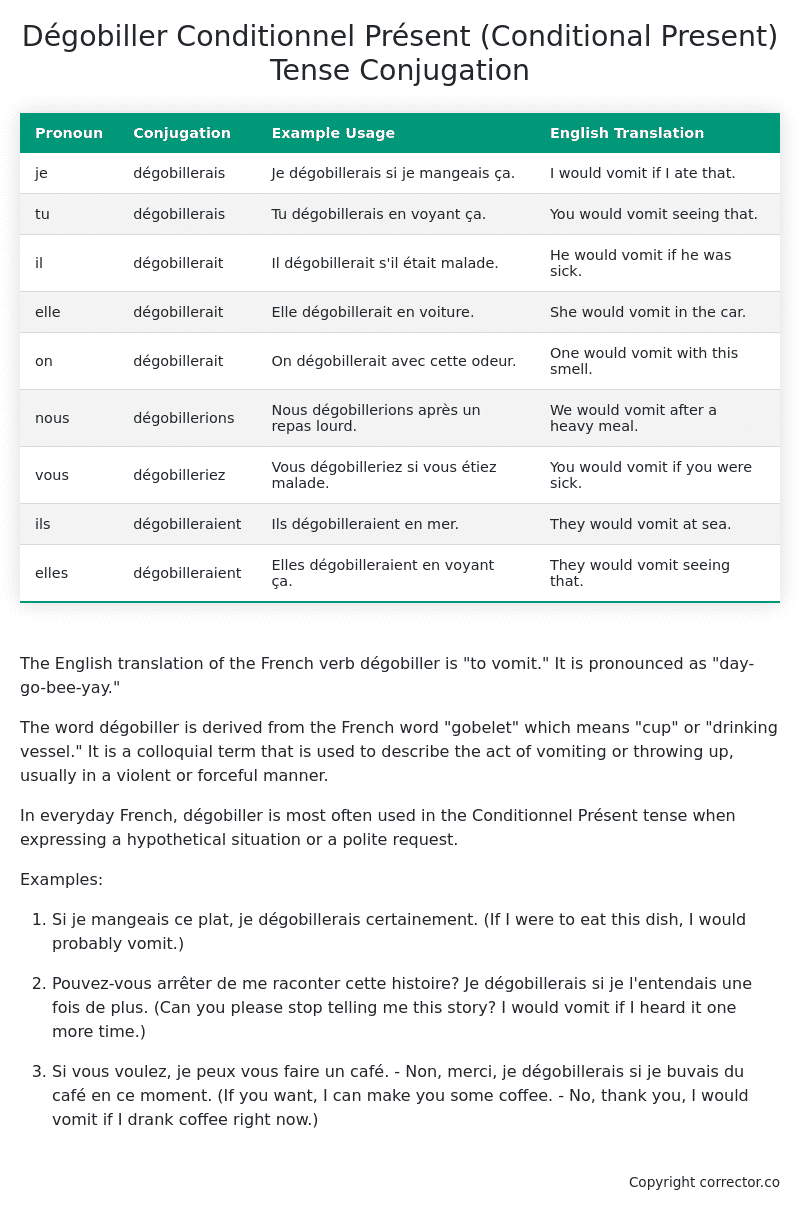Conditionnel Présent (Conditional Present) Tense Conjugation of the French Verb dégobiller
Introduction to the verb dégobiller
The English translation of the French verb dégobiller is “to vomit.” It is pronounced as “day-go-bee-yay.”
The word dégobiller is derived from the French word “gobelet” which means “cup” or “drinking vessel.” It is a colloquial term that is used to describe the act of vomiting or throwing up, usually in a violent or forceful manner.
In everyday French, dégobiller is most often used in the Conditionnel Présent tense when expressing a hypothetical situation or a polite request.
Examples:
-
Si je mangeais ce plat, je dégobillerais certainement.
(If I were to eat this dish, I would probably vomit.) -
Pouvez-vous arrêter de me raconter cette histoire? Je dégobillerais si je l’entendais une fois de plus.
(Can you please stop telling me this story? I would vomit if I heard it one more time.) -
Si vous voulez, je peux vous faire un café. – Non, merci, je dégobillerais si je buvais du café en ce moment.
(If you want, I can make you some coffee. – No, thank you, I would vomit if I drank coffee right now.)
Table of the Conditionnel Présent (Conditional Present) Tense Conjugation of dégobiller
| Pronoun | Conjugation | Example Usage | English Translation |
|---|---|---|---|
| je | dégobillerais | Je dégobillerais si je mangeais ça. | I would vomit if I ate that. |
| tu | dégobillerais | Tu dégobillerais en voyant ça. | You would vomit seeing that. |
| il | dégobillerait | Il dégobillerait s’il était malade. | He would vomit if he was sick. |
| elle | dégobillerait | Elle dégobillerait en voiture. | She would vomit in the car. |
| on | dégobillerait | On dégobillerait avec cette odeur. | One would vomit with this smell. |
| nous | dégobillerions | Nous dégobillerions après un repas lourd. | We would vomit after a heavy meal. |
| vous | dégobilleriez | Vous dégobilleriez si vous étiez malade. | You would vomit if you were sick. |
| ils | dégobilleraient | Ils dégobilleraient en mer. | They would vomit at sea. |
| elles | dégobilleraient | Elles dégobilleraient en voyant ça. | They would vomit seeing that. |
Other Conjugations for Dégobiller.
Le Present (Present Tense) Conjugation of the French Verb dégobiller
Imparfait (Imperfect) Tense Conjugation of the French Verb dégobiller
Passé Simple (Simple Past) Tense Conjugation of the French Verb dégobiller
Passé Composé (Present Perfect) Tense Conjugation of the French Verb dégobiller
Futur Simple (Simple Future) Tense Conjugation of the French Verb dégobiller
Futur Proche (Near Future) Tense Conjugation of the French Verb dégobiller
Plus-que-parfait (Pluperfect) Tense Conjugation of the French Verb dégobiller
Passé Antérieur (Past Anterior) Tense Conjugation of the French Verb dégobiller
Futur Antérieur (Future Anterior) Tense Conjugation of the French Verb dégobiller
Subjonctif Présent (Subjunctive Present) Tense Conjugation of the French Verb dégobiller
Subjonctif Passé (Subjunctive Past) Tense Conjugation of the French Verb dégobiller
Subjonctif Imparfait (Subjunctive Imperfect) Tense Conjugation of the French Verb dégobiller
Subjonctif Plus-que-parfait (Subjunctive Pluperfect) Tense Conjugation of the French Verb dégobiller
Conditionnel Présent (Conditional Present) Tense Conjugation of the French Verb dégobiller (this article)
Conditionnel Passé (Conditional Past) Tense Conjugation of the French Verb dégobiller
L’impératif Présent (Imperative Present) Tense Conjugation of the French Verb dégobiller
L’infinitif Présent (Infinitive Present) Tense Conjugation of the French Verb dégobiller
Struggling with French verbs or the language in general? Why not use our free French Grammar Checker – no registration required!
Get a FREE Download Study Sheet of this Conjugation 🔥
Simply right click the image below, click “save image” and get your free reference for the dégobiller Conditionnel Présent tense conjugation!

Dégobiller – About the French Conditionnel Présent (Conditional Present) Tense
Formation
Common Everyday Usage Patterns
Expressing Polite Requests
Expressing Hypothetical Situations
Expressing Doubt or Uncertainty
Interactions with Other Tenses
Present Tense
Past Tense
Future Tense
Conditional Perfect
Summary
Want More?
I hope you enjoyed this article on the verb dégobiller. Still in a learning mood? Check out another TOTALLY random French verb conjugation!


